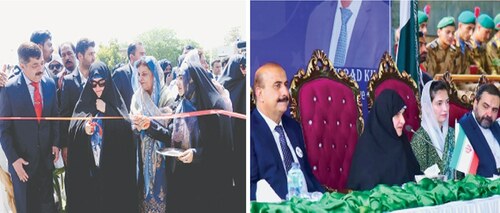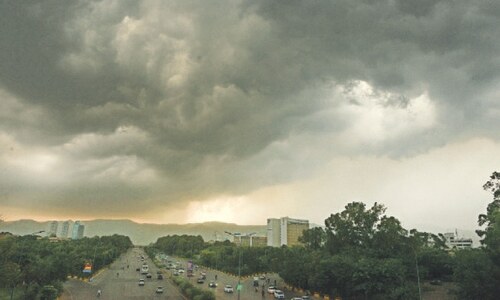As night falls over Deosai, moonlight illuminates the snow-capped mountains and the glacial, turquoise blue waters of the Bara Pani river turn an inky black.
At one of the camps along the stream, Ibrahim Michael douses the campfire with petrol, which responds with leaping flames. He settles down next to the fire and begins playing a slow rhythmic beat on the petrol canister.
A smile spreads across his weathered face as he sings, gesturing to the valley, “raat sitaron mein, din paharon mein” (the night among stars, the day among mountains).
Michael is the head chef at Gondogoro Treks and Tours, which specialises in assisting mountaineers summit some of the world’s highest peaks. Serving hot three-course meals, followed by coffee and green tea in subzero temperatures, these men are a living testament to the north’s famous spirit of hospitality.
In nearly every successful mountaineering expedition, these are the men who climb ahead of trekkers to fix ropes and serve as high-altitude porters and rescuers. At the end a long day, though, they sit with their guests, tell stories, sing songs and dance the Attan around the campfire.
Unlike most chefs, Ibrahim is also an expert mountaineer. He has scaled K2 (8,611 meters), Nanga Parbat (8,126 meters) and Gasherbrums I and II (8, 080 meters and 8,035 meters). “One Frenchwoman was so impressed with my singing that she began calling me Michael, after Michael Jackson. Since then, everyone calls me Ibrahim Michael,” he says in English.
The story of how he came to learn the language brings a smile to his face. “When I started out, I did not know any English. I had never been to school and spent my days herding sheep. People would say ‘Ibrahim bring an apple’ and I would bring a rock. One British man was so annoyed, he paid for me to enrol in English language classes in Islamabad.”
“But today, I can say I have a PhD in these mountains,” he adds with a smile.
Michael takes special pride in assisting women climbers. “I have taken sisters from all over the world to climb these some of the highest peaks. I put their helmets on, tie their harnesses and hand them their ice-picks and help them climb safely to the summit. It gives me immense happiness to see them fulfilling their dreams.”
Security is only one of the reasons why we are seeing fewer tourists. Foreigners are still willing to come to Pakistan, but the government does not facilitate them. The Pakistani visa has become of the toughest in the world to get
Among a number of other safaris, trips, treks and tours, his company organises a 14-day trek to Concordia, the point where the Baltoro Glacier meets the Godwin-Austen Glacier. “Concordia is another world: seeing those mighty eight-thousanders clustered around one area is nothing short of a spiritual experience.”
“We once had an Australian man in the tour group we took to K2 base camp. He never seemed to sleep. He would walk around all night and just stare at the mountains. When I asked him what he saw, he said to me, ‘Ibrahim, I have seen mountains all over the world. I no longer see mountains, I see their maker’.”
He wishes every one could experience the elation he feels when he reaches the summit of a mountain peak after days of climbing through ice and snow. “When I reach the top, unfurl the Pakistani flag, raise it above my head and say the kalima, I can hear the whole Pakistani nation cheering for me.”
A patriotic man, Ibrahim can’t help but be troubled by the violence he sees in Pakistan. “I say, if you want to assert your manliness, conquer a mountain, be a hero. Leave the world at peace,” he says, with a finality.
“In 2012, Shias were offloaded from buses and murdered in Chilas. I asked someone why and they said ‘for heaven’. I said but I am going to heaven too, without violence, without permission and without an NoC,” he says.
As the night wears on, he picks up another beat on the can of petroland sings a prayer for his Deosai: “Yeh Ghar Mera Gulshan Hai, Gulshan Ka Khuda Hafiz” (This home is my garden. May God protect this garden).
Shrinking incomes
Mohammad Ishaq Saqi, the head of Gondogoro Treks and Tours, seems to permanently wear a troubled look on his sun-kissed face. He worries for his people, who depend on tourism for their livelihoods, but are seeing their incomes shrink each year.
The painful memories of the gruesome 2013 terrorist attack at Nanga Parbat base camp is still fresh in many minds. Ishaq’s cousin Mohammad Nabi was among those killed in the attack.
In March this year, both Ishaq and Michael took part in an expedition that travelled on foot from Skardu to Islamabad to promote mountaineering and spread the message of peace.
“But security is only one of the reasons why we are seeing fewer tourists. Foreigners are still willing to come to Pakistan, but the government does not facilitate them. The Pakistani visa has become of the toughest in the world to get. A number of tourists were denied visas this year and many mountaineers faced immense difficulty in acquiring climbing permits,” he says.
Like Michael, Ishaq is also an expert climber, having scaled a number of peaks including Spontik (6,000 meters), Gasherbrum II, Masherbrum (7,821 metres), K-2 and Broad Peak. He also trained as a high-altitude rescuer at the Balti Mountain School and has carried out a number of rescue missions on the world’s highest mountains.
The mountainous Baltistan region, home to the Karakorum Range, is one of the world’s toughest terrains. With little infrastructure and development, adventure tourism is one of the few sources of revenue for the people.
Life for tour operators, high-altitude porters and rescuers such as Ishaq is not easy. “Losing friends is the toughest part of this job. I was with Waqas Siddique, when he was killed last year at the Gondogoro La, the 6,000 metre high pass. On his last night, we stayed up late, making plans for all the tours we would organise in the seasons to come.
“The next morning, as we were descending, he was ahead of everyone. We advised him not to descend without fixed ropes but he said if the locals could do it, so could he. Then he slipped and we could only watch as he skidded down the slope, hitting his head on the way down. I was the first one to reach him. He was alive but very badly injured. So I cradled his head in my lap and asked him to recite the Kalima,”.
“I have lost many cousins and friends on the peaks. But these mountains are our livelihood,” he says.
In 2004, the fiftieth anniversary of the first ascent of K-2 was celebrated which generated large amounts of revenue for the region. According to Ishaq, some 30 men from one small village of Macholo in Khaplu Valley earned 10.7 million Rupees. The porters of another tour company in Baltoro made 8 million Rupees. “This illustrates the potential of the tourism industry to transform lives. And the government is not even required to invest,” he says.
Ishaq hails from the Hushe Valley, three-hours from Khaplu. “With the income from organising tours, the people of Hushe had set up a hostel in Skardu so that girls and boys from the area could study there. We even sent students to Islamabad. Once there were 70-80 students from Hushe studying in Skardu and Islamabad. Today, the number has fallen to 25 as we no longer have the funds to support them,” Ishaq says.
During this summer, he says, a German expedition had contacted his company over the internet and arrangements had been made for their trip to Pakistan.
However, their visas were rejected. “Even when the visa is granted, the application process is very cumbersome. There is a lot of paperwork and applicants are often expected to visit the embassy a number of times. People in Western countries have busy lives, if they are made to visit an embassy more than once, they are likely to go elsewhere,” he says.
This year, a number of expeditions were stranded in Skardu for weeks, awaiting NOCs and climbing permits.
This meant unsuccessful trips for many mountaineers, who depend on certain weather windows for a summit push. “The ministry of tourism and the Gilgit Baltistan Council should work together to simplify the process for acquiring visas and climbing permits, so the people of this region can also earn a livelihood and educate their children,” he said.
Published in Dawn, November 22nd, 2015














































